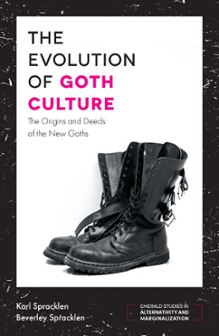
Prelims
The Evolution of Goth Culture: The Origins and Deeds of the New Goths
ISBN: 978-1-78714-677-8, eISBN: 978-1-78714-676-1
Publication date: 3 August 2018
Citation
(2018), "Prelims", Spracklen, K. and Spracklen, B. (Ed.) The Evolution of Goth Culture: The Origins and Deeds of the New Goths (Emerald Studies in Alternativity and Marginalization), Emerald Publishing Limited, Leeds, pp. i-v. https://doi.org/10.1108/978-1-78714-676-120181001
Publisher
:Emerald Publishing Limited
Copyright © 2018 Emerald Publishing Limited
Half Title Page
The Evolution of Goth Culture
Series Page
Emerald Studies in Alternativity and Marginalization
Series Editors: Samantha Holland, Leeds Beckett University, UK and Karl Spracklen, Leeds Beckett University, UK
There is growing interest in work on transgression, liminality and sub-cultural capital within cultural studies, sociology and the social sciences more broadly. However, there is a lack of understanding of the problem of alternativity: what it means to be alternative in culture and society in modernity. What ‘alternative’ looks like is often left unexplored. The alternative is either assumed un-problematically, or stands in for some other form of social and cultural exclusion.
Alternativity delineates those spaces, scenes, sub-cultures, objects and practices in modern society that are actively designed to be counter or resistive to mainstream popular culture. Alternativity is associated with marginalisation, both actively pursued by individuals, and imposed on individuals and sub-cultures. Alternativity was originally represented and constructed through acts of transgression and through shared sub-cultural capital. In contemporary society, alternative music scenes such as heavy metal, goth and punk have spread around the world; and alternative fashions and embodiment practices are now adopted by footballers and fashion models. The nature of alternativity as a communicative lifeworld is now questioned in an age of globalisation and hyper-commodification.
This book series provides a stimulus to new research and new theorising on alternativity and marginalisation. It provides a focus for scholars interested in sociological and cultural research that expands our understanding of the ontological status of spaces, scenes, sub-cultures, objects and practices defined as alternative, liminal or transgressive. In turn, the book series enables scholars to theorise about the status of the alternative in contemporary culture and society.
Titles in this series
Amanda DiGioia, Childbirth and Parenting in Horror Texts: The Marginalized and the Monstrous
Samantha Holland and Karl Spracklen (Eds.), Subcultures, Bodies and Spaces: Essays on Alternativity and Marginalization
Stephen Brown and Marie-Cécile Cervellon, Revolutionary Nostalgia: Neo-Burlesque, Retromania and Social Change
Title Page
The Evolution of Goth Culture: The Origins and Deeds of the New Goths
Karl Spracklen
Leeds Beckett University, UK
and
Beverley Spracklen
Independent Scholar, UK

United Kingdom – North America – Japan India – Malaysia – China
Copyright Page
Emerald Publishing Limited
Howard House, Wagon Lane, Bingley BD16 1WA, UK
First edition 2018
Copyright © 2018 Emerald Publishing Limited
Reprints and permissions service
Contact: permissions@emeraldinsight.com
No part of this book may be reproduced, stored in a retrieval system, transmitted in any form or by any means electronic, mechanical, photocopying, recording or otherwise without either the prior written permission of the publisher or a licence permitting restricted copying issued in the UK by The Copyright Licensing Agency and in the USA by The Copyright Clearance Center. Any opinions expressed in the chapters are those of the authors. Whilst Emerald makes every effort to ensure the quality and accuracy of its content, Emerald makes no representation implied or otherwise, as to the chapters’ suitability and application and disclaims any warranties, express or implied, to their use.
British Library Cataloguing in Publication Data
A catalogue record for this book is available from the British Library
ISBN: 978-1-78714-677-8 (Print)
ISBN: 978-1-78714-676-1 (Online)
ISBN: 978-1-78743-930-6 (Epub)


Contents
| Chapter 1 | An Introduction | 1 | |
| Chapter 2 | Academics and Popular Writers on Goths | 9 | |
| Chapter 3 | Constructing a New Theory of Alternativity | 27 | |
| Chapter 4 | The Origin of the Goths | 37 | |
| Chapter 5 | The Early Deeds of the Goths | 55 | |
| Chapter 6 | The Sisters of Mercy: A Case Study | 71 | |
| Chapter 7 | The Goths and the Globalisation of Popular Culture | 89 | |
| Chapter 8 | Goths as Harbingers of Doom, and Moral Panics about Them | 107 | |
| Chapter 9 | Goth as Virtual Identity and Virtual Culture Online | 123 | |
| Chapter 10 | Whitby Goth Weekend: A Case Study | 137 | |
| Chapter 11 | Goth as Fashion Choice | 155 | |
| Chapter 12 | The End of Goth? | 173 | |
| Chapter 13 | Conclusion | 185 | |
| References | 191 | ||
| Index | 201 | ||
- Prelims
- Chapter 1 An Introduction
- Chapter 2 Academics and Popular Writers on Goths
- Chapter 3 Constructing a New Theory of Alternativity
- Chapter 4 The Origin of the Goths
- Chapter 5 The Early Deeds of the Goths
- Chapter 6 The Sisters of Mercy: A Case Study
- Chapter 7 The Goths and the Globalisation of Popular Culture
- Chapter 8 Goths as Harbingers of Doom, and Moral Panics about Them
- Chapter 9 Goth as Virtual Identity and Virtual Culture Online
- Chapter 10 Whitby Goth Weekend: A Case Study
- Chapter 11 Goth as Fashion Choice
- Chapter 12 The End of Goth?
- Chapter 13 Conclusion
- References
- Index